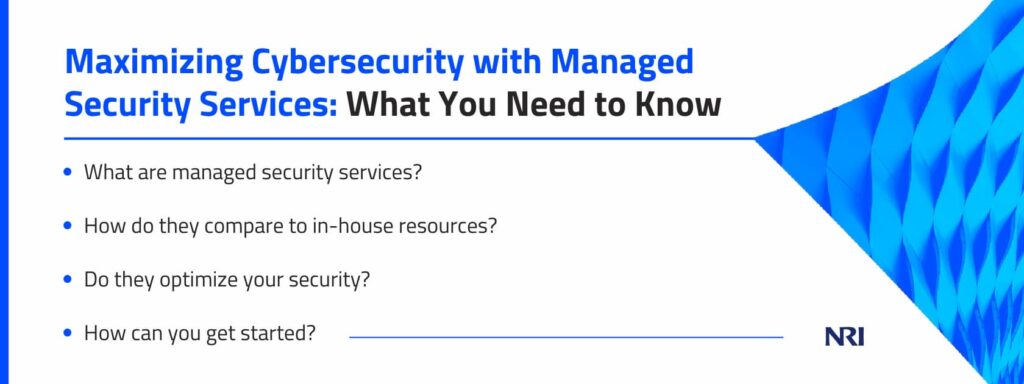With cyber threats evolving daily, leading organizations must stay ahead in protecting their prized assets. A strategic security partnership is one way to navigate current and future challenges.

An IBM survey of over 3,556 cybersecurity and business leaders in 604 organizations that were compromised in 2024 reveals that a breach now takes 194 days to identify and 64 additional days to contain. This is the lowest figure we’ve seen in the last seven years. Still, there’s a lot of room for improvement. On average, these 258 days of disruption cost businesses about $4.88 million. So, you’re right to want to avoid breaches.
Hacking activity has increased significantly and become more damaging. With easy access to off-the-shelf tools, commercial large language models (LLMs), and generative artificial intelligence (genAI), adversaries are now more efficient and sophisticated than ever. Not very long ago, someone had to have really good programming skills to break into an organization. But now, all it takes to launch a full-scale attack is the ability to read, write, and click.
Therefore, businesses must be more cyber vigilant. One way to stay ahead of adversaries is to augment your internal security resources with external expertise. This guide covers everything you need to know to understand and leverage managed security services (MSS) to strengthen your cybersecurity posture. Keep reading.
Managed Security Services (MSS) in a Nutshell: Why You Need Them
Managed security services (MSS) are outsourced cybersecurity solutions provided by a third-party provider. These include comprehensive security coverage, including:
- 24/7 monitoring
- Proactive threat detection
- Vulnerability assessments
- Penetration testing
- Rapid incident management and response
- Regulatory compliance support
In other words, your security partner gives you peace of mind so you can run operations without constantly worrying about adversaries. They are a great asset in navigating ransomware, phishing, distributed denial-of-service (DDoS) attacks, and vulnerabilities of hybrid work environments.
And they save you money, too. According to IBM’s survey, businesses facing a security skills shortage incur $5.74 million, compared to $3.98 million with a low skills shortage. When you leverage MSS, you won’t have a skills shortage, dramatically reducing your cost in case of an event. Your partner will work around the clock and use their expertise in handling complex security scenarios to reduce the likelihood of a breach and keep adversaries out, helping enhance your customers’ and stakeholders’ trust.
MSS may also be a more cost-effective option than a fully fledged team. Per ZipRecruiter, a cybersecurity professional’s average annual salary is $132,962. That’s before factoring in the cost ($4,700 per role) and time (44 days) required for hiring and filling positions when employees leave. It can take up to six months before you break even on your investment in a new cybersecurity hire. The average security operations center (SOC) requires between six and 20 (sometimes more) professionals, depending on the size and complexity of your organization. Maintaining a fully-fledged internal security team in a large enterprise can quickly become expensive.
With MSS, you’re freed from the worry and costs of hiring and re-hiring, as you pay your security partner a fixed monthly fee, keeping your IT costs predictable. Plus, augmenting existing capabilities with these services considerably reduces the operational burden on the internal team, leading to better productivity and security outcomes.
Read More: Could In-House IT Be Holding Your Business Back?
How Managed Security Services Maximize Cybersecurity
A Managed Security Services (MSS) provider enables you to implement unified threat management (UTM) across endpoints, networks, and cloud environments, ensuring real-time monitoring for anomalies and unauthorized access. By leveraging advanced Security Information and Event Management (SIEM) tools, they enhance your network visibility and significantly reduce breach detection and response times—cutting the average recovery time from 258 days to a fraction of that.
A SIEM helps normalize your syslog feeds. Raw syslog feeds from devices, firewalls, servers, switches, and other things running on your network contain a tremendous volume of data. With a SIEM, you can normalize those events and eliminate the background noise to compare apples to apples, not oranges. The solution will include syslog forwarding and monitoring, and ensure the logs haven’t been tampered with by applying a hash to them.
It does correlation, too. For example, if someone attempts to remote into your SSL VPN with an invalid login, let’s say 25 times in the last five minutes, and then remotely connects to a server after gaining access to the SSL VPN, and performs malicious actions, these correlated events are something you need to be aware of and look at immediately, and that’s what advanced SIEM solutions excel at.
The other thing a SIEM does is reduce false alarms. Once optimized for your environment, it does a good job of alerting your MSS provider to things that need immediate attention. It can provide an audit trail if you are subject to PCI DSS, GDPR, HIPAA, CCPA, and other regulations and standards with logging and monitoring requirements.
Your provider will configure your UTM appliance to collect all traffic in your network and forward alarms directly to their federated servers, allowing them to review security events and take countermeasures immediately. They take responsibility for maintaining, updating, and monitoring the appliance and conducting regular vulnerability scans. Often, when computers are compromised, it’s because they were not properly patched. Yet even when you are meticulous about installing your Windows and application updates on time, it’s still possible to miss some at one point or another. Your provider ensures your appliance picks up all necessary patches so your organization is never exposed.
By being proactive about security, your MSS provider will minimize your risk. Still, no security strategy is foolproof, as threats continue to evolve. Should any eventuality occur, your security partner will provide the capabilities to come out on top. More than that, they will conduct a post-incident analysis to discover gaps and harden your systems to prevent future recurrence.
Choosing the Right Managed Security Service Provider
What should be top of mind when choosing a security partner?
- Capabilities: Does the potential candidate have expertise in your industry? Are they familiar with your regulatory requirements? Do they have cutting-edge cybersecurity tools to protect your organization from modern threats?
- Service Offerings: Can they tailor their service to your business needs? Do they provide on-demand support for emerging threats?
- Service Level Agreements (SLAs): Set clear expectations for response times and issue resolution.
- Agility: Can the provider grow with your business and adapt to future challenges?
Read More: 10 Signs You Need Help with Your IT
Getting Started with Managed Security Services
Once you bring the right company on board, there are steps you can take to maximize the value of your partnership.
- Work closely with your partner to comprehensively assess your current cybersecurity posture. This will help identify gaps and areas for improvement to protect critical assets moving forward better.
- Build a solid partnership with your MSS provider. Clearly define roles and responsibilities and establish regular communication and reporting protocols.
- Work with your partner to regularly review threat trends and adapt the organization’s strategies.
- Lastly, don’t overlook your weakest link—employees. Train them about the latest threats and regularly evaluate their cyber readiness to ensure you cover all bases.
Partner with NRI for a More Secure Future
Deciding to use managed security services can be game-changing if you don’t want the stress and cost of managing a fully-fledged security team. It also provides tremendous value, even if you’re just looking to augment internal capabilities. A reliable partner will monitor your technology environment so no vulnerability slips through the cracks. They will ensure you have comprehensive security even as your business grows and threats evolve.
NRI is the leading partner of forward-thinking companies that can’t afford to let security be an afterthought. We bring decades of security expertise and use state-of-the-art solutions tailored to your needs and risk profile. We also help you comply with PCI DSS, GDPR, HIPAA, CCPA, and other data privacy and security regulations.
Let us help you stay proactive about security and grow with peace of mind. Partner with NRI to explore tailored managed security services for your business and safeguard your operations.



